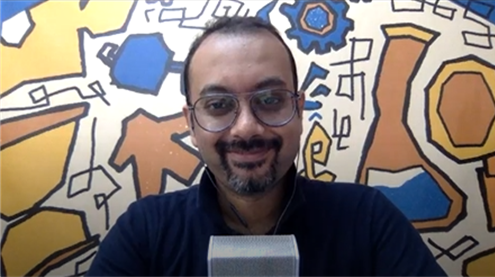By Anirudh Bhargava

Mr Phalgun Polepalli is an engineer from the B. M. S. College of Engineering and has a management degree from the Xavier Institute of Management and Entrepreneurship. He is the director of Dice Toy Labs and is the founder of plinkit.in. He has created many games such as Chariots of Chandragupta, Yuddhabhoomi, Indus, Honeyscouts, and My Bot Bytes.
His Childhood and How It Shaped His Career
Mr Phalgun’s childhood was always occupied in creating something. He would draw cars and its accessories, make spaceships out of shirt boxes, make headquarters for action figures with lifts to move and play monopoly with his cousins until one of them passed out. Also, he used to play many outdoor games in grounds where it was them and a bunch of snakes. They played, bonded and created a ton of memories inspiring him to become a board game designer.
His Journey of Developing His Board Game Company
Creating toys and games was something Mr Phalgun was doing all his life. He got his engineering and management degrees as a fallback, quit his job to start his own company before age 30.
He entered board games after he went to a Toys “R” Us in Japan, where he was greeted by robots , they have a whole isle where you can pick parts and make your own toy train. He loved the design and user experience. He thought that India does not have anything like these customizable toys and started his own company.
Secret sauce to success
Mr Phalgun shared that all the entrepreneurs such as Elon Musk, Steve Jobs or Jeff Bezos were not told what to do at the age of ten. They had a conviction that they would do something great, add value to people, solve some problems and they followed it. They were not trained to do what they are doing. You must find your passion. Elon Musk was not trained to launch rockets into space. That can happen any time in your life. You must figure out what strength that you are born with or that you can develop.
He spoke of the Venn diagram-

Once you figure out center overlap in between, it is the secret sauce to success.
His Thoughts on Education with Respect to Games
There can be multiple aspects to education with respect to board games. He thinks that the purpose of board games is to engage a person and communicate a story. Science, history, and maths can be learnt from a computer monitor. The main things to be taught are creativity, imagination and problem solving. No computer can be creative no matter how advanced the AI is. It cannot paint a Van Gogh or make a Taj Mahal. People look at problem solving from an empathy perspective while computers do not. This is where you want your children to be educated in and games are the best way to teach them.
How to Make Board Game Manufacturing Environment Friendly
90% of board game components are made of paper/cardboard (powdered paper waste) and can be recycled, but still one must be aware. In chess one can replace plastic pieces with wood pieces. However, when you cut the tree, you must plant a tree on behalf of the tree you just cut down. You must create a circular ecosystem where when you do something bad to the environment and you fix it in the other way.
The Future of The Board Game Industry
Mobile games are a solo experience. They do not create memories. You can move into a digital sphere with many players online. However, clicking a card or rolling a dice 
Dealing with setbacks and challenges
When you start a company there will always be setbacks. The question is will you move on or are you going to sit and cry 

Photojournalism, Writing Blogs and Creativity
In photojournalism, we try creating something, capture memories and bring out an interesting story as is. Photography was his passion. To make money out of this, the market that he found was weddings as they were willing to pay anything for creative photography. He differentiated himself by putting his personality into the picture. He would write a blog of his perspective as a photographer and people would hire him to do their weddings just to read his blogs. He also took pictures of places of which his father had taken and realised those were amazingly similar. To view them visit https://petapixel.com/2017/11/02/time-travel-photos-retracing-late-fathers-footsteps-35-years/
His Advice for Viewers and Readers
Children should have fun more often. Get time to chill and discover yourself. Find what that one activity is when you are trying to discover your skills. You should slow down and find your passion. A piece of advice his teacher gave him was that one may not find out what they were good at even after thirty or forty years, so one should always get their hands dirty to figure out what it is that they are good at. Do not stop being creative, being imaginative and adding value to society.
Thank you, sir, for taking the time to talk to us, and sharing your very unique life journey with us.
You can watch the video of this interview on our Youtube channel: https://youtu.be/2nGfRxn8OUA

